PRIVATE DAY CARE RULES ALBERTA
Low wages, no benefits, continue to plague Alberta's child-care system, critics
CBC
Tue, May 28, 2024
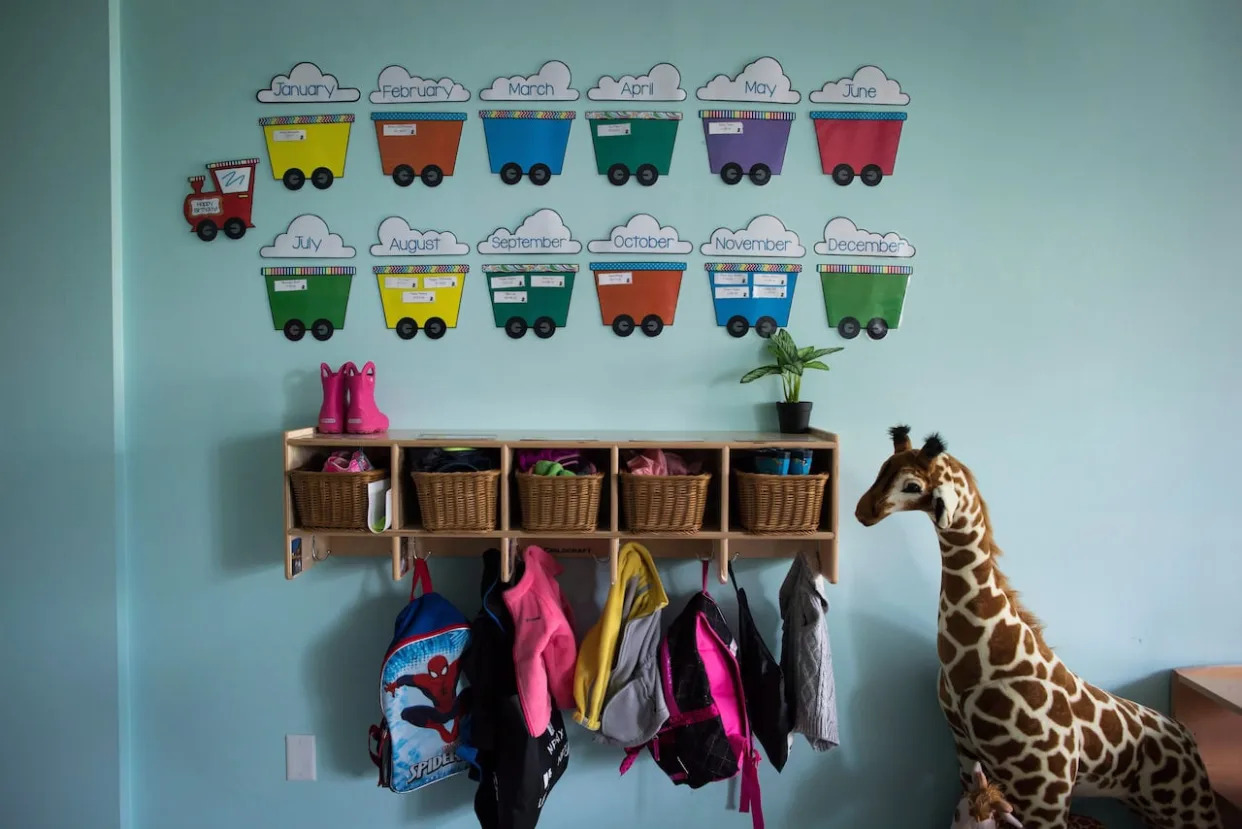
Early childhood educators still receive wages lower than the living wage, and many lack access to pension and benefit plans. (Darryl Dyck/The Canadian Press - image credit)
As Alberta continues to build out its spaces under the Canada-wide child-care system, there are increasing calls to improve compensation for educators who staff child-care centres.
In November 2021, the Alberta and federal governments signed an agreement aimed at bringing down the average fee parents pay for child care to $10 a day by 2026. The five-year deal included $3.8 billion in funding commitments from Ottawa.
Since then, the number of child-care spaces has expanded, but it has proven difficult for operators to find qualified staff to keep up with the demand.
Early childhood educators (ECEs), the majority of whom are women, earn wages close to or below what is considered the living wage in cities like Calgary, Edmonton and Fort McMurray.
Level 1 ECEs, who make up 45 per cent of Alberta's child-care workforce, earn $19.43 an hour after the government's top-up of $2.64. Many ECE positions do not include benefits, paid sick days or a pension plan.
The low pay, and lack of opportunity for advancement, have either kept people from entering the field, or encouraged ECEs to leave. Experts say that needs to change to have the system work as intended where child-care centres are staffed by people trained in early childhood education.
Christopher Smith, associate executive director of the Muttart Foundation, which works to improve the early education and care of young children, said attracting and keeping a qualified workforce requires investment in those workers.
"If you have those educators churning, turning over rapidly, if you have those educators being stressed in their environments or worrying about their own financial well-being, what kind of quality care are they going to be able to provide for children and families?" Smith said.
Right now, educators can receive the same compensation in the food service or retail industries without requiring extra education or experiencing the stress of caring for children, Smith said.
"The ball is in the Alberta government's court," he said. "If you want to have a stable, secure, qualified workforce, then you need to invest in that work just as you would in any other sector of the economy."
No wage grid for Alberta ECEs
A recent report from Child Care Now, a national advocacy group, says Alberta and Ontario are the only two provinces that haven't enacted or committed to a wage grid. A grid lays out pay for each level of ECE which increase with each additional year of service.
The report also says that to help with retention, ECEs should receive non-salaried compensation such as benefits and pension plans.
Matt Jones, Alberta's minister of jobs, economy and trade, is responsible for implementing the province's joint agreement with the federal government.
Jones said his ministry is looking at the idea of a wage grid, but has not made a commitment to introducing one. He said hourly rates would have to be regionalized to take into account areas of Alberta with a higher cost of living, such as Fort McMurray.
He said the province wants to provide funding to operators which allows them to run their child-care centres and attract and retain ECEs by providing them adequate salaries.
"A one-size-fits-all approach is not going to work for operator funding and it's not going to work for ECE compensation because, as you can appreciate, each region of Alberta has a different labour market," Jones said.
Jones said he has been in discussions with his federal counterpart, Families, Children and Social Development Minister Jenna Sudds, about possible tweaks to the current federal-provincial child-care agreement.
Jones could not provide a timeline for when Albertans would see the cost-control framework that has been in the works for a couple of years.
A spokesperson for Sudds confirmed the talks are underway. Implementation of the Early Learning and Child Care Agreement between the federal and Alberta governments includes an increase in wages for child-care workers in addition to a reduction in parent fees, so it is up to the province to make that happen, she said.
Nova Scotia benefits and pension
How wages can go up while fees go down is a question day cares and the government are grappling with.
Last year, the Association of Early Childhood Educators of Alberta proposed a wage grid to the province. The grid started an entry level 1 ECE at a wage of $20.20 an hour, increasing to $24.85 over seven years.
The salary ranges started at $42,016 and topped out at $51,688. The report said proposed wages would need to be updated as they were based on Alberta Labour information from 2019.
Amanda Rosset, chair of the Association of Early Childhood Educators of Alberta, noted that the current wage system is supplemented by government top-ups. She said ECEs don't view the top-up amount as a guaranteed wage, and the amounts are still too low in many areas of the province.
"We look at the living wage report, the average level of wages for ECE is is under in most regions throughout our province," she said.
Many ECEs don't have access to benefits and pension plans. Some daycares are able to offer them to their employees. Others don't.
Nova Scotia has introduced a pension and defined benefits plan for early childhood educators. ECEs can take the plans with them if they move to other child care centres in the province.
Smith, from the Muttart Foundation, said a similar plan in Alberta would help, as access to a pension and benefit plan isn't consistent.
"Why would we think it's OK to have one educator having no paid sick days a year, another educator having 10 [days], essentially doing the same job?" he said. "So we need to approach this on a much more public basis."
More costs to the system
But there are questions about where the money is going to come from.
Krystal Churcher, a daycare operator who is chair of the Alberta Association of Child Care Entrepreneurs, is a prominent critic of the national daycare plan.
She said Ottawa is giving provinces money to increase child-care spaces without a plan to ensure there are workers to staff them.
Churcher says she supports ECEs getting higher wages, and agrees that having a provincial benefits and pension could be advantageous in Alberta.
She is frustrated that a plan to increase workers and pay them better still isn't in place three years into the federal plan, She asks where the money is coming from.
"Are you going to reduce something in your centre to add higher wages for staff? And what is that going to be? Is that your food program? Is that your field trips?" Churcher said.
She said operators are getting only a three per cent increase to their funding this year, which doesn't account for rising rental and utility costs.
"We can't bleed out money any longer," Churcher said.
"We need the either the province to step up and support educators, or the federal government to realize that while it sounds wonderful to keep throwing money into this program to create spaces, if we don't have a solid workforce strategy to staff those spaces, they're absolutely useless."
Diana Batten, the NDP critic for children's services, said the provincial government needs to step up. She said Jones can take action immediately if he wanted to.
"The UCP government has had a long time, years, to set up this wage grid," she said. "It has not happened. There is no reason for this. The early childhood educators have been asking for it."
CBC
Thu, May 30, 2024
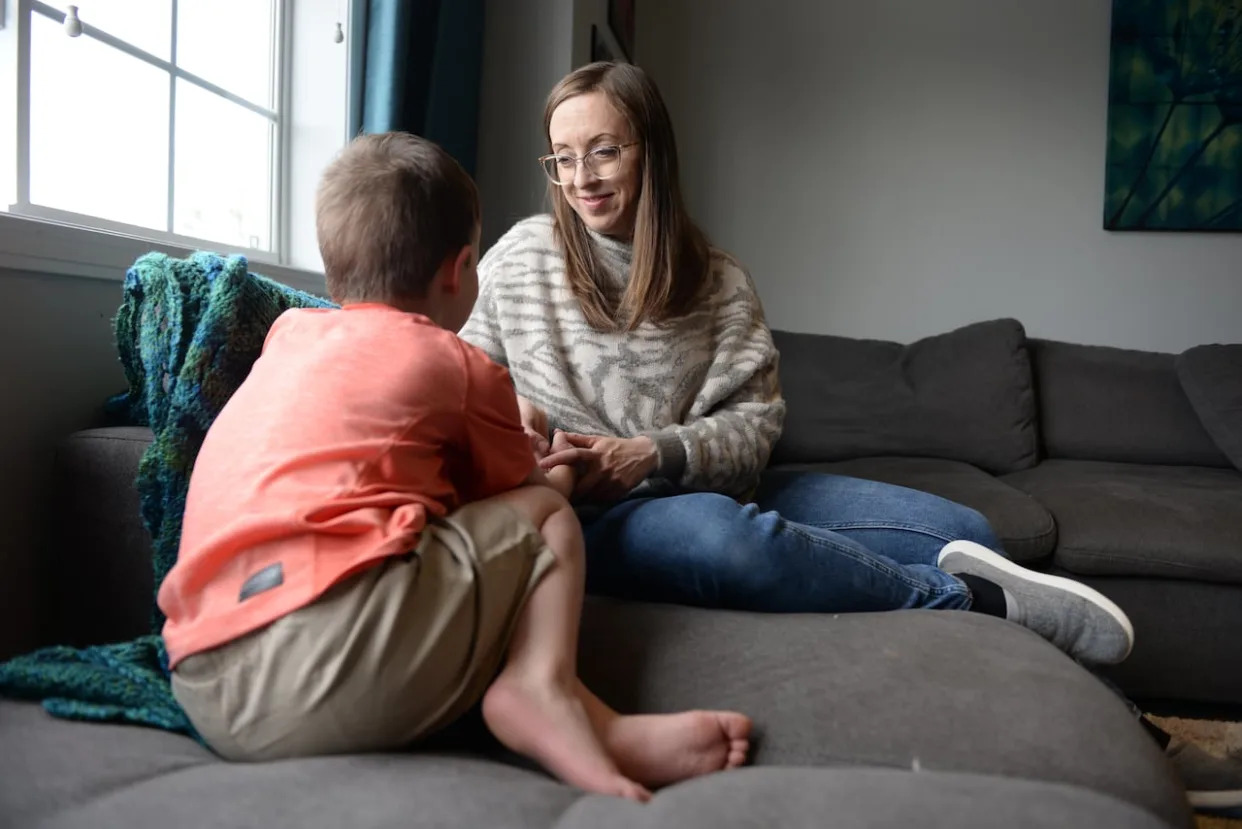
Sarah MacDonald's son was hospitalized during the E. coli outbreak in Calgary last September. She says she still has questions about how such a large and devastating outbreak could have occurred and wants to know what is going to change. (Helen Pike/CBC - image credit)
At a time when Canada is vastly expanding its child-care system, and just eight months after a major E. coli outbreak in Calgary child-care centres, an Alberta Health Services analysis shows the province is lagging in its rate of daycare inspections, falling far short of its guideline of at least two inspections per year at each of the province's licensed daycare centres.
The report, titled Safe Healthy Environments - Childcare Inspection Analysis and obtained under freedom of information, is worrying to the mother of a child hospitalized during last year's outbreak and concerning to public health experts who say the lag in inspection rates is putting kids at risk.
It shows 354 licensed daycares with food facilities did not see an inspection in the twelve months before March 18, 2024. That's just over 20 per cent of Alberta daycares with food services.
Of the 1,315 that were inspected, more than 40 per cent were cited for food handling or hygiene violations. The analysis was prepared by AHS Environmental Public Health and covers the dates from April 1, 2022, to March 18, 2024.
AHS working toward 1 inspection per year
The most common violations were food handling, cleaning and sanitation. The report notes that 97.4 per cent of child-care centres have a kitchen on site, while about 50 facilities obtain their food from a central kitchen.
"This is pretty bad inspection rates considering the sort of high-risk populations," said Keith Warriner, a professor of food microbiology at University of Guelph. He was particularly troubled by the rate of non-compliance, which often resulted in multiple follow-up inspections to correct problems.
Repeated critical food handling and sanitation violations at 145 facilities accounted for multiple health inspectors visits, according to the analysis.
"This tells me a lot of resources are dedicated to try and clean up messes which shouldn't have occurred and letting facilities get away with things before making the ultimate decision to shut them down," Warriner said.
While the province mandates two inspections per licensed daycare, AHS said in a statement to CBC News that it is still working toward meeting a minimum of one routine monitoring inspection of every childcare facility in Alberta, every 12 months.
The review period includes last September's E. coli outbreak in Calgary, which sickened 448 people and hospitalized 39 children and one adult.
The source of the illness was traced to a central kitchen supplying food to multiple daycare centres.
A review panel looking into the incident was expected to report its findings in April but has now been granted an extension by the government until the end of June to give the group more time to talk to parents.
'The system is not safe'
Sarah MacDonald, whose four-year-old son was hospitalized because of the E. coli outbreak, is troubled by the findings in the report.
"I have difficulty understanding why the safety of our children is not a priority," she said in an interview with CBC News.
"We were assured the system was safe, and I think the data is telling a different story. The system is not safe."
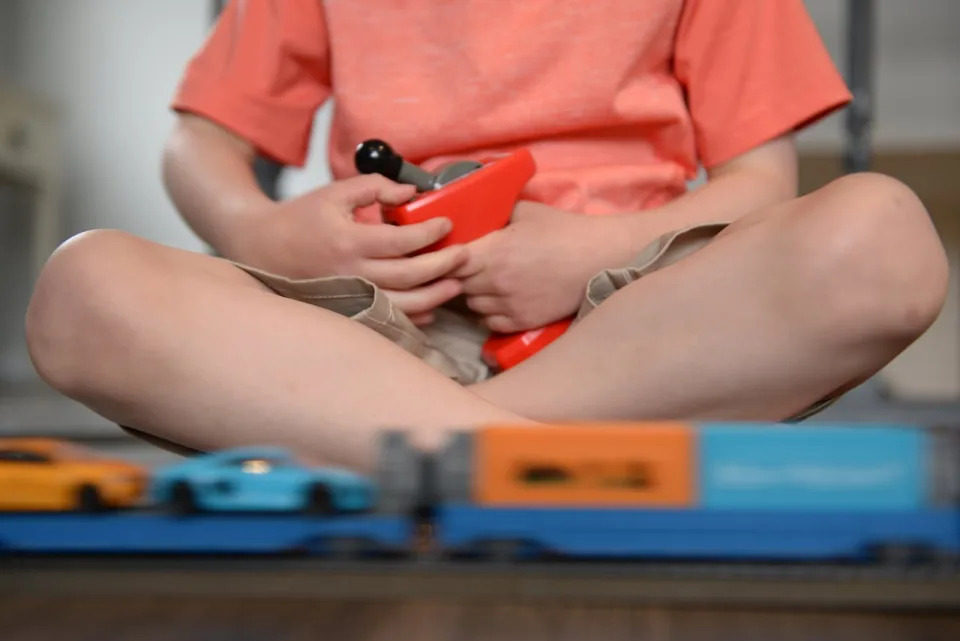
Sarah MacDonald's son, who was hospitalized during the massive E. coli outbreak last September, plays with toys in his Calgary home on May 22, 2024.
Though he's doing well now, MacDonald says her son will need to have his kidneys monitored for the foreseeable future. (Helen Pike/CBC)
MacDonald says her son spent three days in hospital, then suffered at home for another three weeks.
"He was afraid to eat food for a little while afterwards," she said, adding he was also traumatized by the needles and blood tests required for his treatment. "It was really difficult for him to understand."
MacDonald says her son is doing well now, but will need to have his kidneys monitored for the foreseeable future. She still has questions about how such a large and devastating outbreak of E. coli could have occurred in a kitchen serving 11 daycare centres.
Shiga toxin-producing E. coli (STEC) is caused by eating contaminated food and is often associated with bloody diarrhea. Most patients get better on their own, but children are at greater risk of complications. Eight of those hospitalized during the Alberta outbreak were required to go on dialysis.
"I want to know what is going to change," said MacDonald. "I want to know what the consequences are for these businesses, because I know my son has paid a very high price."
The kitchen providing meals to her son's daycare had been inspected 11 times before the E. coli outbreak, and new violations were detected on at least six of those visits, according to AHS inspection records, which show it was also cited for three critical violations in its first inspection after the outbreak was detected.
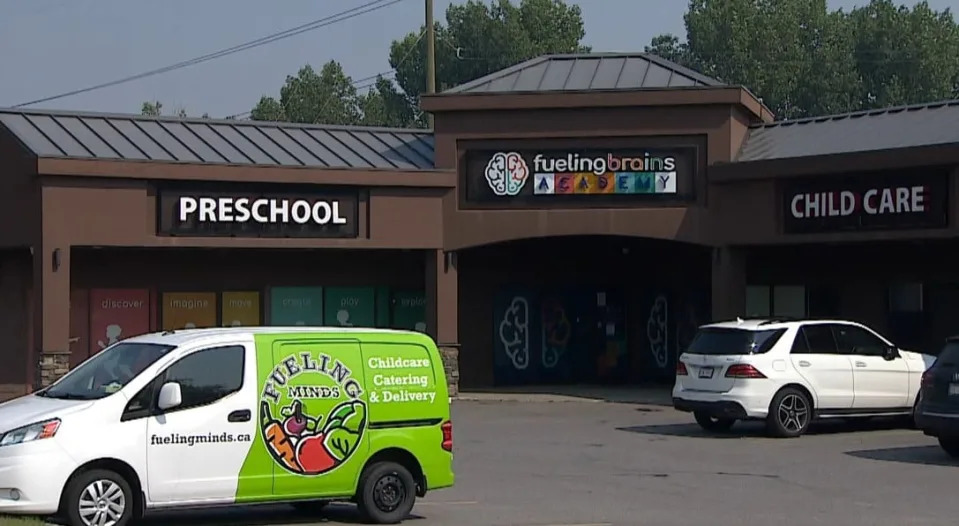
The source of the September 2023 E. coli outbreak in Calgary, which sickened 448 people and hospitalized 39 children and one adult, was traced to a central kitchen supplying food to multiple daycare centres, including six locations of Fueling Brains daycare centres, Alberta Health Services said in a statement at the time.More
The source of the E. coli outbreak, which sickened 448 people and hospitalized 39 children and one adult, was traced to a Calgary central kitchen supplying food to multiple daycare centres, including six locations of Fueling Brains daycare centres, Alberta Health Services said in a statement at the time. (CBC)
Alberta Health Services wrote in an email to CBC News that the role of public health inspectors is to identify hazards and provide education and direction. It said inspectors work to correct violations through ongoing communication and reinspection.
AHS says it has not issued any fines or prosecutions.
Alberta has about 200 public health inspectors responsible for ensuring safety at a wide range of facilities including long term care, restaurants, food trucks, shelters, public housing, nail salons, tattoo parlours and child-care centres.
High-risk population
The former manager of food safety at Toronto Public Health reviewed key elements of the analysis for CBC News. Jim Chan raised flags about rates of inspection and non-compliance.
"The number of child-care centres that have not been inspected for the full year is quite high," he said.
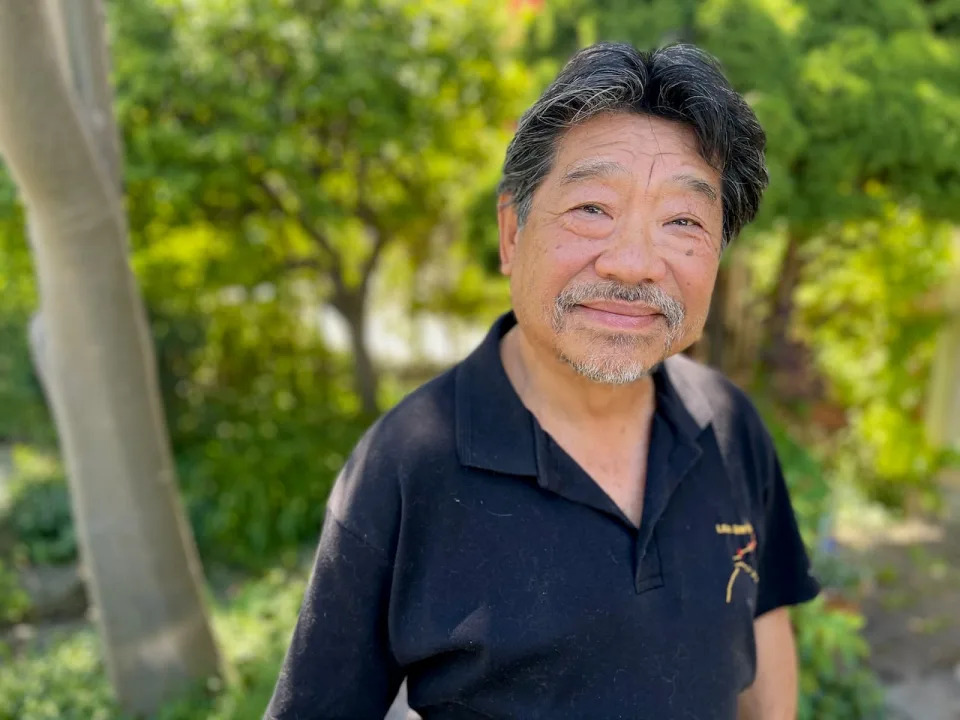
Jim Chan, the former manager of food safety at Toronto Public Health raised flags about inspection rates and non-compliance rates in Alberta child-care centres after reviewing key elements of a provincial analysis for CBC News, noting that child-care centres in Ontario that serve food receive a minimum of three inspections per year.More
Jim Chan, the former manager of food safety at Toronto Public Health raised flags about inspection rates and non-compliance rates in Alberta child-care centres after reviewing key elements of a provincial analysis. He noted that child-care centres in Ontario that serve food receive a minimum of three inspections per year. (Craig Chivers/CBC)
"To me that is a very crucial type of risk," he said, noting that child-care centres in Ontario that serve food receive a minimum of three inspections per year.
He also found Alberta's 44 per cent non-compliance rate in 2023 to be high compared with Toronto, where he says he sees a rate of nine to 10 per cent in a given year.
"That can be a risk to the clients, which in a daycare are very young. Very young and very old can be classed as a high-risk population."
Concerns about cutting corners
Concerns about inspections come at a time when Alberta's child-care system is seeing a massive expansion.
The federal government is pouring $3.8 billion into lowering daycare costs and adding 68,700 new spaces in Alberta by 2026.
The number of children attending daycare in Alberta has already soared by about 35 thousand since 2021, according to the province.
The added demand coupled with lower fees paid to operators under the federal plan is placing a lot of pressure on the daycare business, according to Sarah Hunter, the owner of The Imagination Tree, a Calgary daycare.
Her centre is filled to capacity at 95 children. Though she says she takes care to ensure that her centre follows proper food handling procedures, she worries others may not as budgets become increasingly tight.
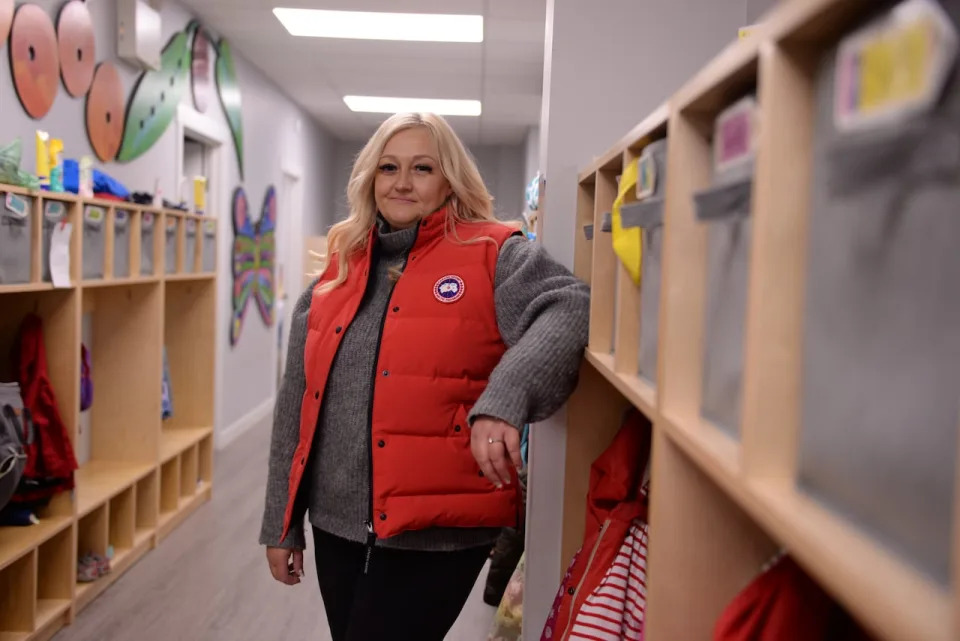
Sarah Hunter, the owner of the Imagination Tree, is pictured at the Calgary daycare centre on May 23, 2024. Though she says she ensure her centre follows proper food handling procedures, she worries others may not as budgets become increasingly tight.
Sarah Hunter, the owner of the Imagination Tree daycare in Calgary, says that though she ensures her centre follows proper food handling procedures, she worries others may not as budgets become increasingly tight. (Helen Pike/CBC)
She says problems will arise when centres are desperate to stay in business.
"You're gonna cut corners wherever you have to cut them," she said in an interview. "So if that involves not meeting regulation on some days, maybe that's what you're … forced to do."
"To run a clean, organized, well-staffed quality program costs money, and it costs a lot of money."
The double whammy
Mike Parker, the head of the Health Sciences Association of Alberta representing health inspectors in the province, worries that his members can't keep up.
"We don't have the inspectors on the streets today to do the work," he said.
According to the most recent annual report from AHS, the total number of food safety inspections has fallen by about fifteen thousand per year since 2018.
Parker says the problem is a growing number of facilities to inspect, coupled with demands to reinspect some places multiple times.
"That's the double whammy," he said. "Our members are stretched, trying to get to as many as they can."
"Our kids are vulnerable to this when we can't ensure their safety."
Despite those concerns, the federal government says it's satisfied with the province's rollout of the new daycare plan.
Shortly after announcing more federal money for inclusive child care in Edmonton on May 16, federal Minister of Employment and Workforce Development Randy Boissonnault, told CBC News he had no issues with Alberta's approach to inspections.
"I'm confident in the safety of kids and the province doing what it needs to do to make sure that kids are safe."
In a written statement to CBC News, AHS said it was still working through a backlog of inspections resulting from the pandemic.
AHS also notes it has made substantial efforts to identify central kitchens that provide food to multiple child-care facilities in Alberta.
After initially agreeing to speak with CBC News, Alberta Health Minister Adriana LaGrange cancelled on Wednesday. Her office said she would provide written responses to questions.
LA REVUE GAUCHE - Left Comment: Search results for BABA CARE
No comments:
Post a Comment